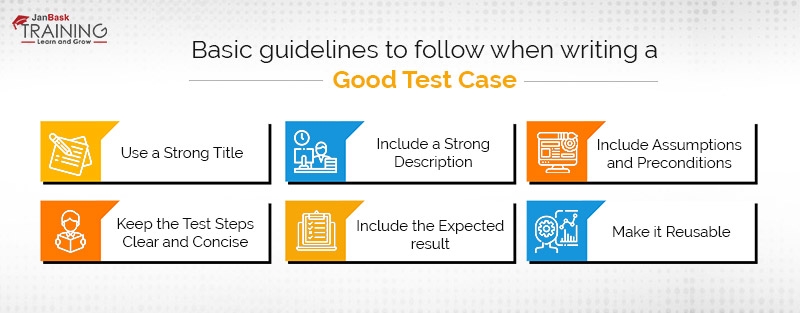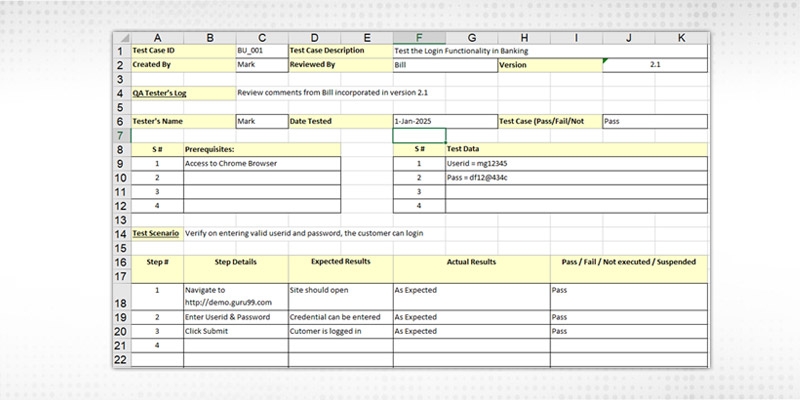18
DecChristmas Offer : Get Flat 35% OFF on Live Classes + $999 Worth of Study Material FREE! - SCHEDULE CALL
Christmas Offer : Get Flat 35% OFF on Live Classes + $999 Worth of Study Material FREE! - SCHEDULE CALL
Test case design techniques help guide the tester through a sequence of steps to validate whether a software application is free of bugs and working as required by the end-user. A Test Case contains test steps, data, precondition, and postcondition developed for specific test scenarios to verify any requirement. Learning how to write test cases requires basic writing skills, attention to detail, and a good understanding of the application under test (AUT). This can be better achieved by the QA Master or the testing team through different testing techniques and tools. Joining a QA certification course can help you gain relevant skillsets related to Testing techniques.
Typically, test cases for a given module or part of an application, are grouped into a test suite. More often than not, a test session will include many test cases as there will usually be more than one specific scenario to be tested.
The test case includes specific variables or conditions, using which a QA tester can compare expected and actual results to determine whether a software product is functioning as per the requirements of the customer.
A well-written test case should permit any tester to comprehend and execute the test.
When writing test cases, it's imperative to imagine the client's perspective and to incorporate all the important details. Well written test cases can mean the distinction between a very much tried application and an ineffectively tried application.
A good Test Case template maintains test artifact consistency for the test team and makes it easy for all stakeholders to understand the test cases. Writing a test case in a standard format lessens the test effort and the error rate. Test cases format is more desirable in case you are reviewing test cases from experts.
Before moving on to good test case writing guidelines, if you’re considering pursuing a QA testing career, go through a comprehensive guide on what is software QA testing? which will help you understand the basics of QA testing, the prerequisites to begin your career in the domain, and much more.

A good test case starts with a strong title. As a best practice, it’s acceptable to name the test case similarly as the module that you are trying. For instance, if you’re testing the login page, include “Login Page” in the title of the test case. In some cases, if the tool you’re using doesn’t already do this, it might make sense to include a unique identifier in the title of the test case as well, so the identifier can be referenced instead of a long title.
The description should tell the tester what they’re going to test. Once in awhile this area may likewise incorporate other relevant data, for example, the test condition, test information, and preconditions/presumptions. A depiction ought to be anything but difficult to peruse and promptly impart the elevated level objective of the test.
You should include any assumptions that apply to the test and any preconditions that must be met prior to the test being executed. This information can include which page the user should start the test on, dependencies on the test environment, and any special setup requirements that must be done before running the test. This information also helps keep the test steps short and compact.
Test cases should be basic. Remember, the individual who wrote the test case probably not be a similar individual who executes the test itself. The test steps should include the necessary data and information on how to execute the test. This is perhaps the most important part of a test case. Keep this segment clear and concise, but don’t leave out any necessary details. Write the test case with a goal that anyone can go in and perform the test.
The expected result tells the tester what they should experience as a result of the test steps. This is how the tester determines if the test case is a “pass” or “fail”.
A good test case is reusable and provides a long-term incentive to the software testing team. When writing a test case, keep this in mind. You can spare time down the road by re-using the test case instead of re-writing it.
Remember that, there are Software Testing Principles / Software Testing Best Practices that helps the testing team to function in a productive manner by making maximum utilization of time and efforts, to determine if the Testing is progressing in the right direction. It should be disciplined enough to incorporate all the important testing principles as a baseline.
Do you wish to equip yourself with the learnings/skills that are required to qualify the QA Software Testing Certificates by coming a step closer to your dream career run? Then join JanBask Training that nurtures your skills to make you ready for an amazing “Career Run”!
Irrespective of the test case documentation method chosen, any good test case template must have the following fields
|
Test Case Field |
Description |
|
Test case ID: |
|
|
Test Priority: |
|
|
Name of the Module: |
|
|
Test Designed by: |
|
|
Date of a test designed: |
|
|
Test Executed by: |
|
|
Date of the Test Execution: |
|
|
Name or Test Title: |
|
|
Description/Summary of Test: |
|
|
Pre-condition: |
|
|
Dependencies: |
|
|
Test Steps: |
|
|
Test Data: |
|
|
Expected Results: |
|
|
Post-Condition: |
|
|
Actual Result: |
|
|
Status (Fail/Pass): |
|
|
Notes: |
|
Optionally you can have the following fields depending on the project requirements

Go through Software Testing Tutorial Guide for Beginners who are planning to take their first step in this domain.
There's no set in stone spot to archive your test cases, but there are numerous tools that help make the way toward writing test cases more effective and efficient. For instance, test cases have generally been written in a spreadsheet. Many testing teams still opt for this approach. It’s fairly flexible, you can create your own process and method of tracking test cases, but it can also be extremely tedious, and burdensome. Don’t worry! we’ve shared 21 coolest software testing tools with their features & benefits.
QA Software Testing Training

Some teams use project management tools to document their test cases. This is a great alternative to a spreadsheet as it introduces collaboration. But there are many dedicated tools available for writing test cases.
With a tool dedicated to testing cases, you can write your test cases, perform your tests, report on the results, and collaborate with your team throughout every step of the process. This is where TestLodge really shines.
The very practice of writing test cases helps prepare the testing team by ensuring good test coverage across the application but writing test cases have an even broader impact on quality assurance and user experience.
Test cases will help uncover a lot of information early on; information that can ultimately improve the quality of your product. Here are some additional benefits to writing test cases:
Writing test cases puts you in your user’s shoes, which builds empathy for the individuals who will actually be using your product. This empathy can easily trickle back into the design and development process and have a broad impact. As you write test cases, you’ll identify gaps and areas for improvement, things that don’t quite make sense, and these things can be addressed before the application is released into production. Learn more why becoming a software tester the best career choice!
Writing test cases means any new testers that are hired can easily get up to speed on the product without much training. After all, test cases outline exactly how to use the product and what is expected as a result of different actions.
A good set of test cases accessible by other team members makes it easier for others to learn about the product as well. Think of customer support, for example. The support team can browse test cases to understand how upcoming features are going to work. They can use those test cases to write technical documentation and help content.
Effective writing of test cases is an important step in the software testing process. It might sound unimportant but to ensure a crystal clear performance of a QA software tester, one needs to follow its steps. This in-depth tutorial on test case writing techniques and tools, covers all the nuances of a test case.
The QA test team should not be tired of getting involved in improving these tasks, as it is the best approach for geeting greater accomplishments in quality.This is proven in many test organizations around the world on mission essential projects and complex applications. Achieve greater career heights with our QA software testing certification training program for making you one step closer to your dream project.
Hope you have gained knowledge on Test case writing skills. You can enroll for a self-learning QA testing course to get practical and project-based knowledge of software testing.
Q1. When do we write test cases?
Ans- Usually, test cases are written-
Q2. Name some types of test cases.
Ans- Some types of test cases include-
Q3. What are the components of a test case?
Ans- The components of a test case are-
Q4. What is the course objective of Software testing?
Ans- The core objective of our QA testing course is to provide a QA certification course online that gives experiences similar to offline classrooms and saves students’ burden of traveling to the physical classes, their finances, energy & time, and gives them a complete QA Testing discipline preparation by covering concepts, skills, techniques that QA tester certification & job role demands.
Q5. What will I be learning in this course?
Ans- Here are all that you will learn in this course-
Q6. How to maintain a career in QA testing?
Ans- One can maintain a rising QA career by learning new innovations, techniques, or upgrades in QA Testing methods, by qualifying for multiple software Testing certification exams. The more QA Testing certification exams you will take, the more you will attract the attention of recruiters.
Q7. What can I expect after the course?
Ans- After completing our QA software testing training online, you will achieve competent skills & knowledge all set to be applied during the certification exam of QA Testing and smart & well-calculated approaches to proceed & absorb in the lucrative job markets.
The JanBask Training Team includes certified professionals and expert writers dedicated to helping learners navigate their career journeys in QA, Cybersecurity, Salesforce, and more. Each article is carefully researched and reviewed to ensure quality and relevance.

Cyber Security

QA

Salesforce

Business Analyst

MS SQL Server

Data Science

DevOps

Hadoop

Python

Artificial Intelligence

Machine Learning

Tableau
Interviews